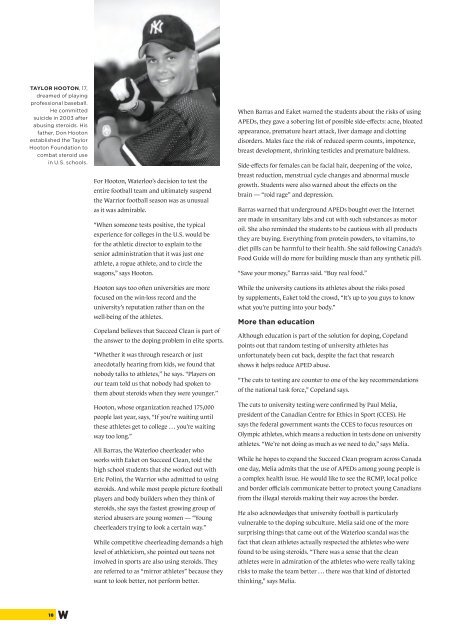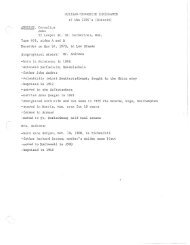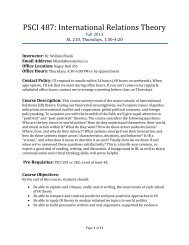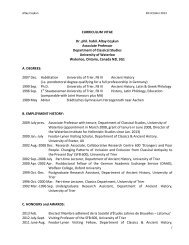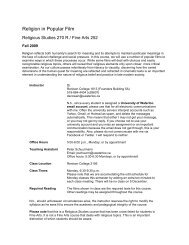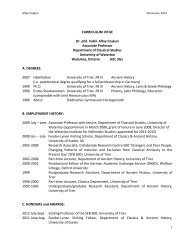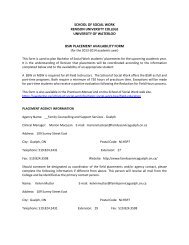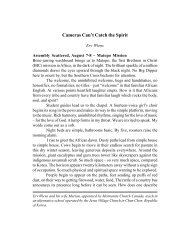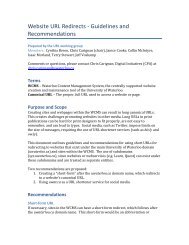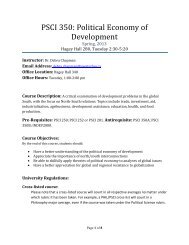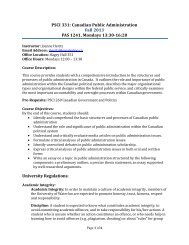uNivErSity oF WAtErloo MAgAZiNE
uNivErSity oF WAtErloo MAgAZiNE
uNivErSity oF WAtErloo MAgAZiNE
You also want an ePaper? Increase the reach of your titles
YUMPU automatically turns print PDFs into web optimized ePapers that Google loves.
Taylor Hooton, 17,<br />
dreamed of playing<br />
professional baseball.<br />
He committed<br />
suicide in 2003 after<br />
abusing steroids. His<br />
father, Don Hooton<br />
established the Taylor<br />
Hooton Foundation to<br />
combat steroid use<br />
in U.S. schools.<br />
For Hooton, Waterloo’s decision to test the<br />
entire football team and ultimately suspend<br />
the Warrior football season was as unusual<br />
as it was admirable.<br />
“When someone tests positive, the typical<br />
experience for colleges in the U.S. would be<br />
for the athletic director to explain to the<br />
senior administration that it was just one<br />
athlete, a rogue athlete, and to circle the<br />
wagons,” says Hooton.<br />
Hooton says too often universities are more<br />
focused on the win-loss record and the<br />
university’s reputation rather than on the<br />
well-being of the athletes.<br />
Copeland believes that Succeed Clean is part of<br />
the answer to the doping problem in elite sports.<br />
“Whether it was through research or just<br />
anecdotally hearing from kids, we found that<br />
nobody talks to athletes,’’ he says. “Players on<br />
our team told us that nobody had spoken to<br />
them about steroids when they were younger.’’<br />
Hooton, whose organization reached 175,000<br />
people last year, says, “If you’re waiting until<br />
these athletes get to college . . . you’re waiting<br />
way too long.”<br />
Ali Barras, the Waterloo cheerleader who<br />
works with Eaket on Succeed Clean, told the<br />
high school students that she worked out with<br />
Eric Polini, the Warrior who admitted to using<br />
steroids. And while most people picture football<br />
players and body builders when they think of<br />
steroids, she says the fastest growing group of<br />
steriod abusers are young women — “Young<br />
cheerleaders trying to look a certain way.”<br />
While competitive cheerleading demands a high<br />
level of athleticism, she pointed out teens not<br />
involved in sports are also using steroids. They<br />
are referred to as “mirror athletes” because they<br />
want to look better, not perform better.<br />
When Barras and Eaket warned the students about the risks of using<br />
APEDs, they gave a sobering list of possible side-effects: acne, bloated<br />
appearance, premature heart attack, liver damage and clotting<br />
disorders. Males face the risk of reduced sperm counts, impotence,<br />
breast development, shrinking testicles and premature baldness.<br />
Side-effects for females can be facial hair, deepening of the voice,<br />
breast reduction, menstrual cycle changes and abnormal muscle<br />
growth. Students were also warned about the effects on the<br />
brain — “roid rage” and depression.<br />
Barras warned that underground APEDs bought over the Internet<br />
are made in unsanitary labs and cut with such substances as motor<br />
oil. She also reminded the students to be cautious with all products<br />
they are buying. Everything from protein powders, to vitamins, to<br />
diet pills can be harmful to their health. She said following Canada’s<br />
Food Guide will do more for building muscle than any synthetic pill.<br />
“Save your money,” Barras said. “Buy real food.”<br />
While the university cautions its athletes about the risks posed<br />
by supplements, Eaket told the crowd, “It’s up to you guys to know<br />
what you’re putting into your body.”<br />
More than education<br />
Although education is part of the solution for doping, Copeland<br />
points out that random testing of university athletes has<br />
unfortunately been cut back, despite the fact that research<br />
shows it helps reduce APED abuse.<br />
“The cuts to testing are counter to one of the key recommendations<br />
of the national task force,” Copeland says.<br />
The cuts to university testing were confirmed by Paul Melia,<br />
president of the Canadian Centre for Ethics in Sport (CCES). He<br />
says the federal government wants the CCES to focus resources on<br />
Olympic athletes, which means a reduction in tests done on university<br />
athletes. “We’re not doing as much as we need to do,” says Melia.<br />
While he hopes to expand the Succeed Clean program across Canada<br />
one day, Melia admits that the use of APEDs among young people is<br />
a complex health issue. He would like to see the RCMP, local police<br />
and border officials communicate better to protect young Canadians<br />
from the illegal steroids making their way across the border.<br />
He also acknowledges that university football is particularly<br />
vulnerable to the doping subculture. Melia said one of the more<br />
surprising things that came out of the Waterloo scandal was the<br />
fact that clean athletes actually respected the athletes who were<br />
found to be using steroids. “There was a sense that the clean<br />
athletes were in admiration of the athletes who were really taking<br />
risks to make the team better . . . there was that kind of distorted<br />
thinking,” says Melia.<br />
18


